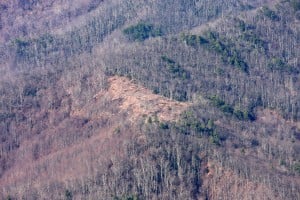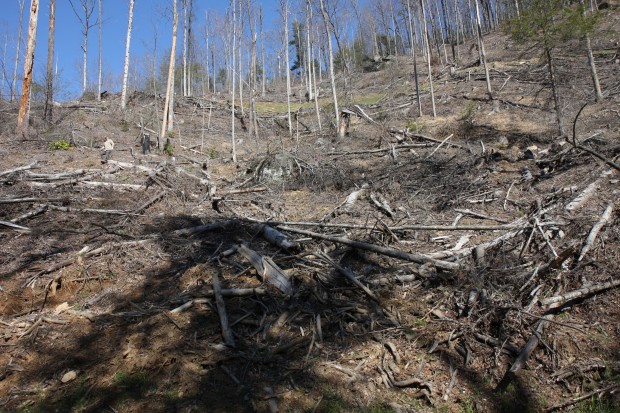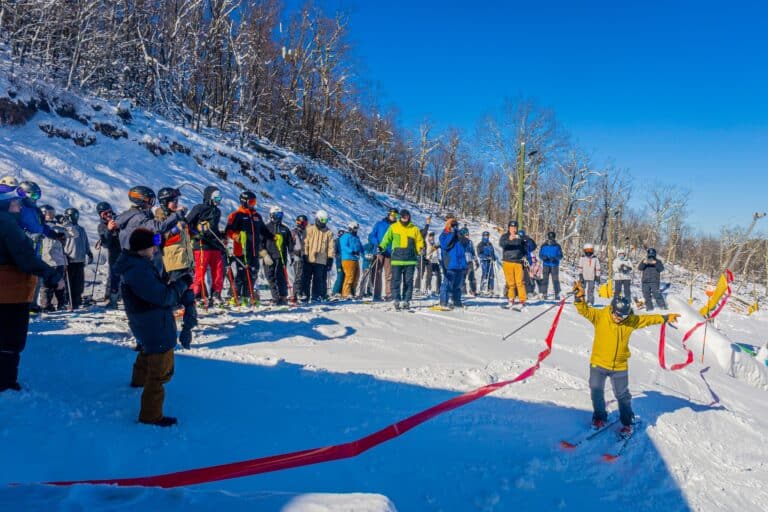“Devastated,” says Perrin de Jong when I ask him what it felt like to stand in the recent logging remains in the Globe Forest, a wild and scenic area of Pisgah National Forest.
“The assurances you receive from folks who advocate for logging that everything will grow back one day don’t mean anything because you are standing in the midst of a scene that looks so starkly different from what it looked like before it was knocked over.”
De Jong is the Campaign Coordinator for Wild South, an Asheville based non-profit, and he recently witnessed the aftermath of timber harvests in the Globe. One such site, says de Jong, lies directly off the path from the China Creek/Upper Thunderhole Trail, a popular mountain biking area.
In response to a loud and collective resistance in 2006 from the community of Blowing Rock to logging plans in the Globe, the Forest Service compromised by scaling back their logging and road-building plans for the area and preserving Old Growth forest.
As early as next year, the Forest Service will redraft its Forest Plan for Pisgah National Forest, the first opportunity for change at the agency level in almost 20 years.
“The Forest Service has agreed to consider a new special designation to protect the unique and fragile resources of the proposed Grandfather National Scenic Area,” says de Jong. “In the meantime, our message is that we are interested in showcasing the Globe Timber Sale as an example of what we can expect from the current Forest Plan, so we can have a conversation about what we would like to see in the new plan, now that we have an opportunity to start from scratch.”
Called the Grandfather Mountain National Scenic Area, the plan would secure interim protection for a 25,500 acre tract in Pisgah until Congress agrees to permanent protection.
The Globe is a valuable regional asset. It provides recreation for climbers, anglers, hikers, mountain bikers, and backpackers. Rare and diverse wildlife live in its unique mature forest habitat. Charlotte sources its drinking water from the Catawba River that runs through the Globe. The Globe forest draws millions of annual visitors who appreciate the scenic views, which fuels the local economy.
De Jong points out that, like many of our nation’s rural communities that neighbor forests, the area’s economy relies heavily on tourism. That is, tourism directly related to the natural beauty of the area. And those areas depend on the Forest Service to provide protection from resource exploitation. If the sustainability of the Globe Forest is at risk, the economies of Boone, Banner Elk, and Blowing Rock are also at risk. 
“We did a study,” says de Jong, “asking people if the scenery of the area was degraded, would you come back? Fifty percent said they wouldn’t come back. Tourists drive the Blowing Rock economy by passing through. We found a direct link between scenic quality and economic benefits that tourism provides to local communities.”
While the Scenic Area does request protection for the area, de Jong wants to be clear that it will not be Wilderness Area, which is much more restrictive of human use. Rather, a Scenic Area is a way to preserve the natural assets of an area while allowing, even encouraging, recreational use. Ideally, says de Jong, Wild South would like to see a forest management scheme that “ensures that if any active management is taking place, it is not at the expense of the key and unique qualities of the area.” The qualities he means are those that make it such a draw for millions of tourists— the rare and diverse wildlife, old growth forest, water quality, recreational access, and of course, scenic values.








